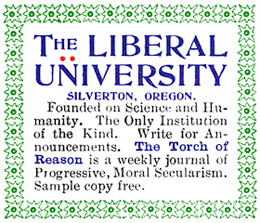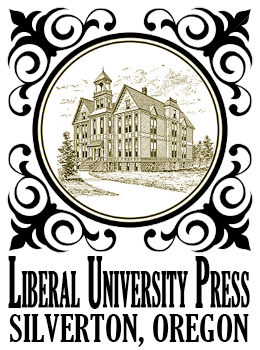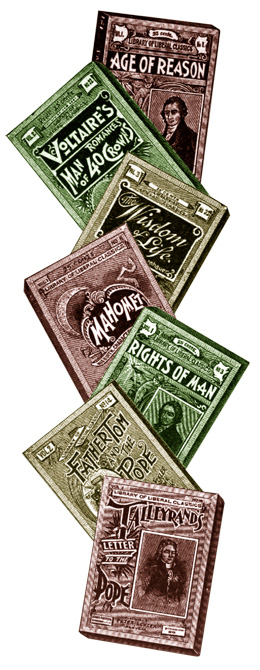By Moses Harman — April, 1897
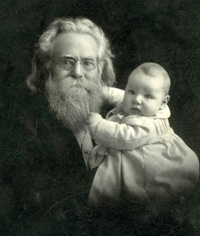 In the March, 1897 number of this Magazine the editor promises that in the next issue “Moses Harman, editor of ‘Lucifer,’ will give his Free Love creed, as it were—set forth fully what he believes and advocates on the marriage question.”
In the March, 1897 number of this Magazine the editor promises that in the next issue “Moses Harman, editor of ‘Lucifer,’ will give his Free Love creed, as it were—set forth fully what he believes and advocates on the marriage question.”
As fully as possible in the space allowed, I will try to make good this promise.
My creed is short. Instead of “Thirty-nine” articles, it has but three:
- I believe in Freedom—the negation of all slaveries.
- I believe in Love—the negation of all hate.
- I believe in Wisdom, Knowledge utilized—the negation of all ignorance.
I put Freedom first, because, until freedom prepares the way, neither Love nor Wisdom can have room to live and grow. In these three—Freedom, Love, Wisdom—we have a creed much better adapted to working out the problems of life than is the trinity of our childhood—”Father, Son and Holy Ghost.”
If belief in this trinity, and if a life regulated in accord therewith, constitute one a “Free Lover,” then I do not object to the cognomen. Whether Free Lover is a title of honor or dishonor will depend upon what is in the mind of the speaker. “As a man thinketh in his heart so is he.” Names count for but little, and are apt to be misleading. For this reason I do not label or tag myself, and I object to being tagged by others. Freethinker, Rationalist, Libertarian, are good and expressive, but each has its limitations in the minds of most people. Free Thought, to my mind, includes and necessitates free action- free, non-invasive action. The thought that has not the courage of its convictions—that fears to practicalize and live what it believes to be right-is not Free Thought. It is thought under bondage to fear.
Yes, I believe in Freedom—equal freedom. I want no freedom for myself that all others may not equally enjoy. Freedom that is not equal is not freedom. It is, or may easily become, invasion, and invasion is the denial or the death of freedom. The Spencerian formula: “Each has the right to do as he pleases, so long as he does not invade the equal right of others,” tells what freedom means. It is equivalent to saying that liberty, wedded to responsibility for one’s acts, is the true and only basis of good conduct, or of morality. But to particularize:
I believe in Freedom to choose and to refuse in matters of food, of drink, of clothing, of books, of paintings, of amusements, or recreations, and-most important of all—I believe in freedom to choose and refuse in matters pertaining to companionships with the other sex.
Freedom to choose our food and drink relates mainly to the life of the individual, but the choice of sex-companionship relates mainly to the life of the race, and is therefore incomparably the more important, inasmuch as the whole includes all the component units. The main effort of nature, in the plant and the animal, is to “keep the ball of life rolling”—to preserve the race or species from dying out, with less regard as to what becomes of individual units. Hence amative desire, or sex-love, is more imperious—less under control of calculating prudence, than is any other inherited desire or passion-and rightly so.
Freedom of choice—to be freedom—must be unlimited as to time. To be able to choose the kind or quality of one’s food or drink but once in a lifetime would not be freedom. It would be the negation, the suicide of freedom. And so also in sex-companionships. The right to make mistakes and to profit by them is vitally necessary to human happiness and progress, and pre-eminently is this true in the most important of all human relationships—that which grows out of the differentiation called sex, since this relationship concerns not only the happiness, the unfoldment, of each individual, but for weal or foe, for success or failure, for uplifting or for degeneracy, it is this relationship that reproduces the race—the larger selfhood.
I believe in Love; because love is the uniting, the combining, the organizing, the creative force of the universe. It is also the refining, the purifying, the uplifting, the glorifying, the happifying force of the universe. Who or whatever debases or kills love, debases or kills life; for life is evolved and preserved through love. Without love life is a desert-not worth having.
I believe in Wisdom—knowledge utilized-because without wisdom to guide, both freedom and love may fail to bring lasting happiness. I believe in wisdom; it is the result of the exercise of love in freedom—love profiting by its mistakes; hence wisdom is the child of love in freedom.
It is because I believe in this trinity that I do not believe in marriage. These three are humanity’s saviors and marriage crucifies them all. Marriage destroys freedom and compels slavery. Marriage kills love and incarnates hate. Marriage is the inveterate foe of wisdom and incarnates ignorance.
“Free Love” is tautological, since there can be no love where freedom is not. If love survives marriage it is not because of, but in spite of, marriage. Bond love is a misnomer, an impossibility. The attempt to bind love kills it, or changes it to jealousy and hate. Love, freedom, wisdom, constitute life’s zenith, its sunshine; marriage, jealousy, hate, mean life’s nadir, its darkness. “Ignorance is the only darkness,” says Shakespeare, and marriage promotes and compels ignorance, lest its victims learn how to gain their freedom.
I accept and heartily endorse Mr. Green’s motto for the proposed new Free Thought organization, “Truth, Justice and Purity,” and because I endorse that noble trinity I am an opponent of marriage and an advocate of love in freedom.
I oppose marriage because marriage opposes truth. Marriage is the hot-bed, the prolific breeding ground of deception, hypocrisy, falsehood. By its anti-natural requirements it compels men, and especially women, to dissemble and hide their real thoughts, their real characters, and after the fateful knot is tied the necessity for living a lie is often augmented many fold. Whether they love or not, the married pair must still profess that they are true to each other and to their marriage vows; and this perpetual profession helps, of itself, to bring the disillusioning. But the disillusioning does not release from the necessity of deception, but rather increases it. The retroactive effect of this habitual deception is fatal to health and to noble development of the wedded pair themselves, and by inexorable causation the children born of such unions are hereditary liars and hypocrites. What wonder that there is so little of candor, of truth and of honesty in business, in politics, in religion, in love, and in all the relations of life?
I oppose marriage because it opposes justice. Marriage is unjust to woman-depriving her of her right of ownership and control of her person, of her children, her name, her time and her labor.
Marriage is unjust to children-depriving them of their right to be born well through natural selection; depriving them of the right to be born of love-of love on all three planes, the physical, the intellectual and the psychic; and compelling them to be born of indifference or of disgust, on one or more of these planes; depriving them of their right to be reared in an atmosphere of concord and love, instead of an atmosphere of in harmony and hate. Unjust to woman and man alike, in that it deprives both of their natural right to correct their mistakes whenever they recognize them to be such; condemning them to a hell on earth until one or the other, in sheer desperation, shall commit what the marriage law calls a crime sufficiently heinous to release them-after passing through the added hell of the divorce court. What wonder that the world is filled with hate, with greed, with strife, with wars-of households and of nations-when we remember how and where human beings are made, and reared?
I oppose marriage because it opposes Purity. Purity in sex companionship is inseparable from love. Marriage does not recognize love as essential to purity; else it would demand the annulment of the marriage bond whenever there is a failure of love. Marriage unites “for better or worse,” and marriage secures the worse by killing love. Marriage is ownership, especially the ownership of woman by man; marriage is “force, authority, law, and love instinctively rebels against all force, all law, except its own.
Hence marriage fosters and compels impurity, prostitution, within its own pale—the worst of all prostitutions, since it is in marriage, mainly, that children are born. Marriage promotes impurity—prostitution—outside its own pale. Marriage is the prolific source of unmarried prostitution. The brothel is the legitimate outgrowth and complement of modern marriage.
I oppose marriage for much the same reason that I opposed its twin relic of barbarism, African slavery-because I believe it to be the “sum of all villainies,” and I say of the laws made to enforce it, as Garrison said of the Constitution of the United States-they are a “covenant with death and a league with hell,” figuratively speaking.
Many other indictments, equally damning might be made against this time-dishonored institution, but I have room only to say that I oppose marriage because I regard it the heaviest load that humanity has now to carry in its toilsome march from the lowlands of barbarism to the highlands of true civilization.
It will doubtless be objected that evolution has been at work, and marriage is now only a “contract,” to those who wish to make it such. Never was a greater mistake. The law dictionaries and the encyclopedias tell quite a different story. They tell us that “its complete isolation from all other contracts is constantly recognized by the courts.” “In marriage every right and duty is fixed by law.” And the law of marriage is based on the old Roman and the Canon law, both of which put the wife in the power of the husband-sink her individuality in that of the husband.
That marriage is less brutal than it once was is because man has risen faster than his institutions, and in spite of his institutions. Hence most husbands are better than the marriage laws authorize or allow them to· be. But the same may be said of the old slave owners. As Burke said of government, so we may say of marriage: “Talk not of its abuse; the thing, the thing itself, is the abuse.” To abolish the abuses of marriage, then, is to abolish marriage.
“But what will you give us instead of marriage?” it will doubtless he asked. This is like asking what will you give us when you take away disease or superstition. The answer is, when disease is gone, health will remain; when superstition is gone, nature and reason will remain; when marriage is gone, Truth, Justice and Purity will remain.
Honor, candor, honesty, fidelity will remain. Fewer children will be born, because none will be born except such as are wanted, and they will be welcomed and cared for by mutual affection. The true, rational family will take the place of the narrowly selfish despotism now called by that name. Each member of the voluntary groups will drop to his place like stones in an arch when artificial props are removed. Government by authority will cease, because no longer needed.
Love, friendship, liberty, equality, fraternity, peace and happiness will take the place of hate, despotism, war and misery. As to monogamy-a very different thing from marriage—’Under the reign of love, freedom and wisdom, there will be an opportunity for intelligent comparison, and if monogamy proves itself the fittest it will survive; otherwise it will give way to something better. What that something would or could be cannot be told until a fair comparison is possible.
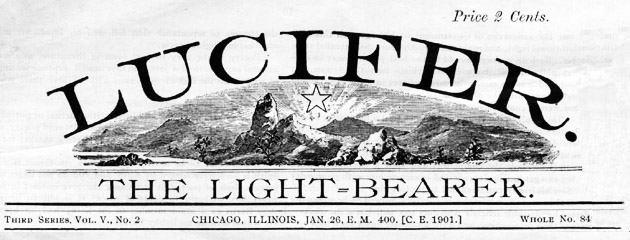
The readers of the Magazine who may care to know what ground Lucifer’s editor takes on the relation of the late tragedy at Boston to the marriage question will be supplied gratis with copies of that paper by writing to: Lucifer the Light-Bearer, 1394 West Congress Street, Chicago.


